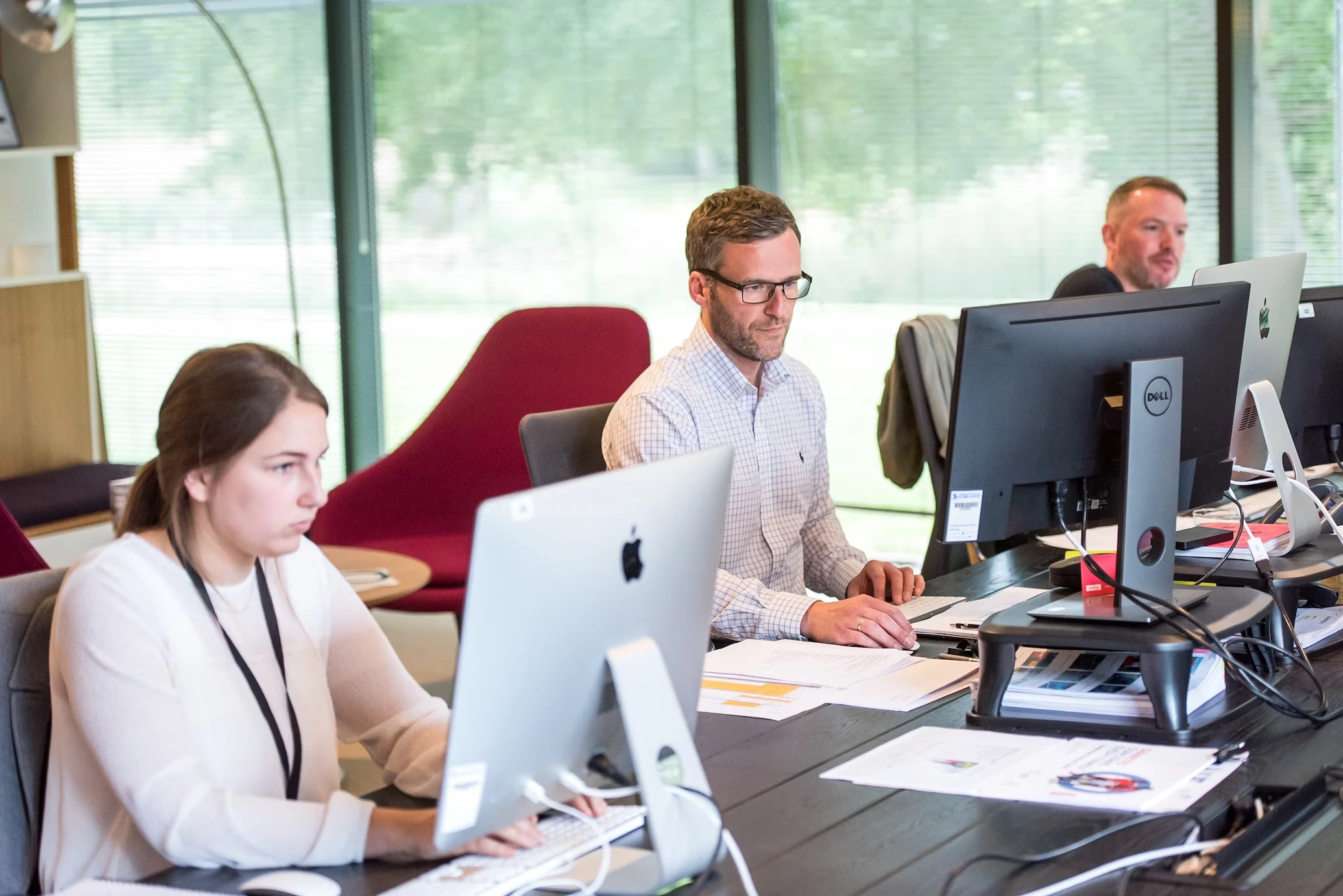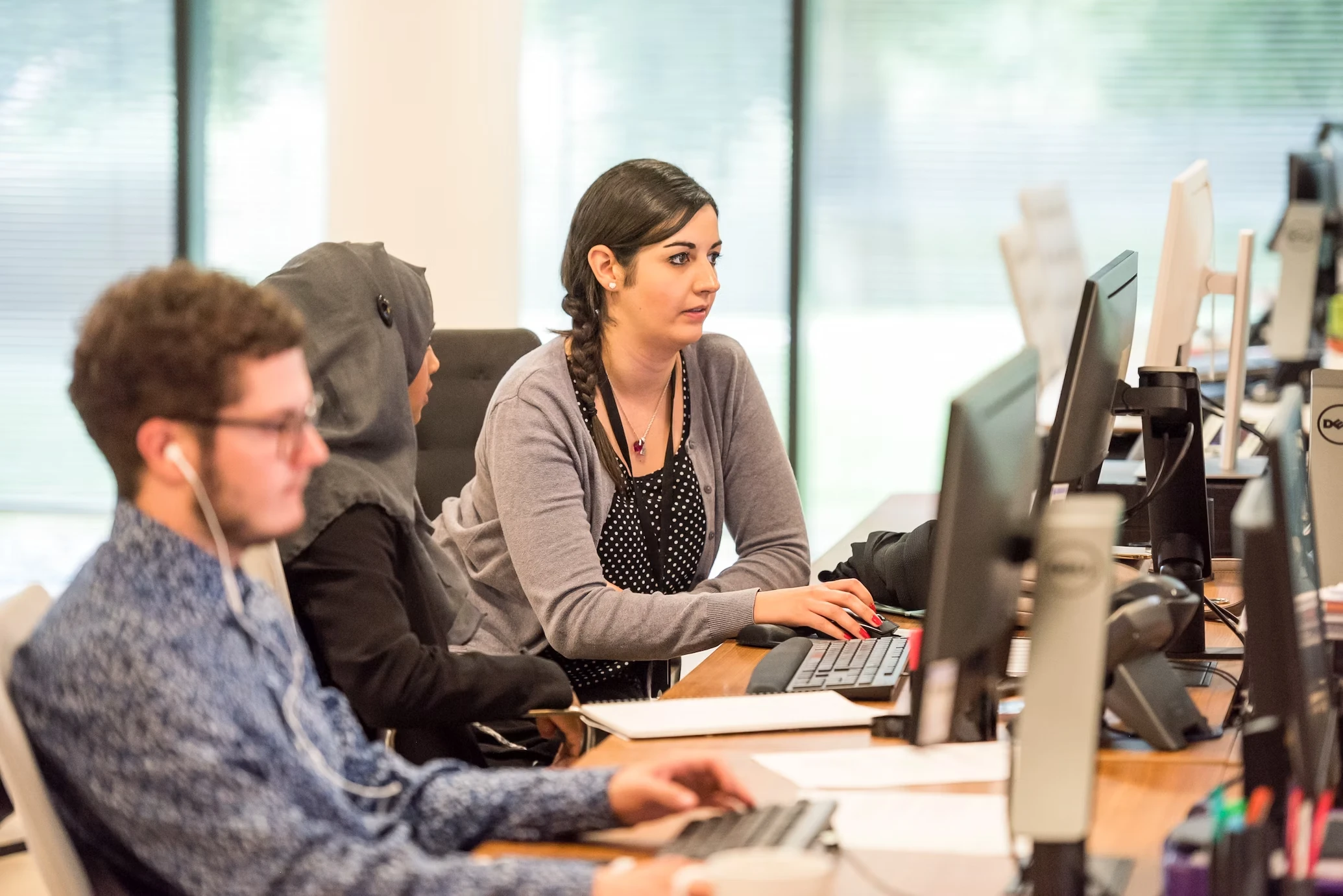
This website uses cookies
We use Cookies to ensure better performance, recognize your repeat visits and preferences, as well as to measure the effectiveness of campaigns and analyze traffic. For these reasons, we may share your site usage data with our analytics partners. Please, view our Cookie Policy to learn more about Cookies. By clicking «Allow all cookies», you consent to the use of ALL Cookies unless you disable them at any time.
In recent years, the integration of mobile apps in education has revolutionized the way students learn and teachers teach. Mobile apps offer a wide range of benefits such as personalized learning, interactive content, and real-time feedback. They enable students to learn at their own pace, anytime and anywhere, fostering a more flexible and engaging learning environment.
The article also explores the key trends and innovations in mobile app development for education. These include the use of augmented reality (AR) and virtual reality (VR) to create immersive learning experiences, gamification techniques to make learning more enjoyable, and the integration of artificial intelligence (AI) for personalized and adaptive learning. Additionally, the article discusses the growing importance of mobile app security, data privacy, and parental control features to ensure a safe and secure learning environment.
Mobile App Development Trends in Education
Adaptive Learning Apps:
The development of adaptive learning apps marks a significant trend in educational technology. These apps use algorithms to adjust the difficulty level and type of content based on the learner's performance in real-time. This approach ensures that each learner receives a customized learning experience that aligns with their unique pace and understanding.
Such apps not only track progress but also identify areas where a learner might need more focus, thereby facilitating a more efficient and effective learning process.
Customizable Content Based on Individual Needs and Learning Styles:
Recognizing that every student has a unique way of learning, educational mobile apps are now offering options to customize content according to individual learning styles and needs. Whether it's visual, auditory, reading/writing-preference, or kinesthetic learning, these apps are equipped to deliver content in various formats.
This level of customization ensures that learners are more engaged with the material, leading to better retention and understanding of concepts.
Gamification to Enhance Engagement and Motivation:
Gamification in educational apps is another trend gaining momentum. By incorporating game design elements like points, badges, and leaderboards, these apps make learning more interactive and fun.
This approach has been particularly effective in keeping learners motivated and engaged, especially among younger audiences. Gamification not only adds an element of competition but also provides immediate feedback, which is crucial for learning and development.
The trend of personalized learning through mobile apps is reshaping the educational landscape. By leveraging technologies like adaptive learning, customizable content, and gamification, these apps are not just facilitating learning but are also making it a more enjoyable and personalized experience. As these trends continue to evolve, they hold the promise of making education more accessible, engaging, and effective for learners worldwide.
Virtual and Augmented Reality (VR/AR)
Virtual and Augmented Reality (VR/AR) technologies have gained significant traction in the field of education, providing new and immersive ways of learning.
Immersive learning experiences through VR/AR apps:
VR/AR apps offer students the opportunity to delve into immersive learning experiences. By wearing VR headsets or using AR-enabled devices, students can explore virtual environments that simulate real-world scenarios. This enables them to engage with the subject matter in a more interactive and memorable way, fostering deeper understanding and knowledge retention.
Simulation-based training and virtual laboratories:
VR/AR technology is revolutionizing practical training and laboratory experiences. Through simulation-based training, students can practice complex procedures and experiments in a safe virtual environment. This approach eliminates the need for expensive equipment and mitigates risks associated with real-life experiments. Virtual laboratories enable students to conduct experiments and manipulate virtual objects, enhancing their hands-on learning experience.
Field trips and virtual tours using AR technology:
AR technology transforms traditional field trips by overlaying digital information onto the real world. Students can use their mobile devices or AR glasses to access additional information, 3D models, and interactive elements related to their surroundings. Whether exploring historical sites, natural habitats, or museums, AR-enhanced virtual tours provide educational context and enrich the learning experience by offering detailed insights and interactive components.
The integration of VR/AR into education expands the possibilities for experiential learning, making education more engaging, immersive, and impactful. As these technologies become more accessible and affordable, they have the potential to revolutionize the way students learn and experience the world around them.
Mobile Learning Management Systems (LMS)
Mobile Learning Management Systems (LMS) have transformed the way education is delivered and managed. These platforms offer a range of benefits for both students and educators, making learning more accessible and convenient. Here are some key aspects of Mobile LMS:
1. Mobile-friendly platforms for accessing course materials, assignments, and grades: Mobile LMS provide a user-friendly interface optimized for mobile devices. Students can easily access their course materials, view assignments, and track their grades from anywhere, anytime using their smartphones or tablets. This flexibility allows for seamless learning on the go.
2. Seamless integration with existing LMS or standalone mobile LMS apps: Mobile LMS can be integrated with existing Learning Management Systems or can function as standalone apps. This integration ensures that students and educators have access to a unified platform where they can manage and track their learning activities. It enables easy synchronization of course content, grades, and other relevant information across different devices and platforms.
3. Real-time collaboration and communication features: Mobile LMS facilitate real-time collaboration among students and educators. Features such as discussion forums, messaging, and video conferencing allow for interactive engagement and effective communication. Students can easily ask questions, participate in group discussions, and receive timely feedback from their instructors, enhancing the learning experience.
Mobile LMS offer a convenient and efficient way to manage educational materials and interact with course content. Their mobile-friendly design, integration capabilities, and collaborative features make them powerful tools for enhancing the learning process. With the increasing use of mobile devices in education, Mobile LMS are becoming an integral part of modern educational systems, providing students and educators with a seamless and flexible learning experience.
Microlearning and Bite-Sized Content
Microlearning and bite-sized content refer to the practice of delivering short, easily consumable learning modules that provide focused and efficient learning experiences. This approach has gained popularity due to its benefits in terms of flexibility, engagement, and knowledge retention. Here are three key aspects of microlearning and bite-sized content:
1. Short, easily consumable learning modules: Instead of traditional lengthy courses, microlearning breaks down complex topics into small, bite-sized modules. These modules are designed to be easily consumed in a short amount of time, typically ranging from a few minutes to 15-20 minutes. This approach allows learners to fit learning into their busy schedules and helps prevent cognitive overload by presenting information in manageable chunks.
2. Microlearning apps for quick and focused learning on the go: Microlearning is often delivered through dedicated apps or platforms that provide easy access to learning materials. These apps offer flexibility by enabling learners to access content anytime, anywhere, making it convenient for on-the-go learning. Learners can engage with short quizzes, videos, interactive exercises, and other multimedia elements to reinforce their understanding of the topic.
3. Integration of multimedia elements for enhanced engagement: Microlearning leverages multimedia elements such as videos, animations, infographics, and interactive exercises to enhance learner engagement and retention. These elements help to break the monotony of text-based learning and provide a visually appealing and interactive learning experience. By incorporating multimedia, microlearning aims to cater to different learning styles and make learning more enjoyable and effective.
Overall, microlearning and bite-sized content offer a flexible and engaging approach to learning, allowing learners to acquire knowledge quickly and conveniently while maximizing retention through the use of multimedia elements.
Innovations in Mobile App Development for Education
Artificial Intelligence (AI)
Artificial Intelligence (AI) has revolutionized various aspects of mobile app development for education. The integration of AI technologies in educational apps has opened up new possibilities for personalized learning experiences, efficient assessment, and instant support. This section explores three key innovations powered by AI in mobile app development for education.
1. Intelligent tutoring systems for personalized guidance and feedback
Intelligent tutoring systems leverage AI algorithms to provide personalized guidance and feedback to students. These systems analyze individual learning patterns, preferences, and progress to offer tailored instruction and support. AI-powered educational apps can adapt to the specific needs of learners, providing them with customized learning pathways that align with their strengths and weaknesses. By offering personalized guidance, these apps ensure that students receive appropriate instruction, enhancing their overall learning outcomes.
2. Automated grading and assessment tools
Traditionally, grading and assessment have been time-consuming tasks for educators. AI-based mobile apps have streamlined this process by employing automated grading and assessment tools. These tools use machine learning algorithms to evaluate and grade students' assignments, quizzes, and exams. By automating the grading process, educational apps powered by AI not only save teachers' time but also offer faster and more objective feedback to students. This immediate feedback helps students identify areas for improvement and take necessary steps to enhance their understanding and performance.
3. Chatbots for instant support and assistance
Mobile apps for education often integrate AI-powered chatbot functionality to provide instant support and assistance to students. These chatbots can understand and respond to user queries, offering real-time help and guidance. Students can ask questions, seek clarifications, or request additional resources through the chatbot interface. By using natural language processing (NLP) algorithms, chatbots can understand and interpret user queries accurately, delivering relevant information promptly. This feature enables students to receive immediate support, even outside of regular classroom hours, fostering enhanced engagement and knowledge acquisition.
AI-driven innovations in mobile app development for education have significantly transformed the learning experience. Intelligent tutoring systems, automated grading tools, and chatbots have made education more personalized, efficient, and accessible. By harnessing the power of AI, mobile apps in education are empowering students, teachers, and institutions to achieve better educational outcomes.
Blockchain Technology
Blockchain technology has emerged as a promising innovation in mobile app development for education. It offers various benefits, including secure storage, transparency, and decentralization. This section explores three key applications of blockchain technology in mobile app development for education.
1. Secure storage and verification of educational credentials
Blockchain technology provides a secure and tamper-resistant system for storing and verifying educational credentials. Mobile apps leveraging blockchain can create digital records of degrees, certifications, and other educational accomplishments. These records are cryptographically secured and stored on a distributed ledger, making them highly resistant to alteration or forgery. Blockchain-based systems enable students to have complete control over their credentials, allowing them to share them securely with potential employers, educational institutions, or other relevant parties.
2. Transparent and tamper-proof records of achievements and certifications
Blockchain technology enables the creation of transparent and tamper-proof records of achievements and certifications. Mobile apps can utilize blockchain to record and validate educational accomplishments such as grades, awards, and extracurricular activities. The decentralized nature of blockchain ensures that these records cannot be manipulated or tampered with, providing a high level of trust and integrity. Employers and educational institutions can easily verify the authenticity of these records, streamlining the credential verification process.
3. Decentralized learning platforms and peer-to-peer validation
Blockchain technology facilitates the development of decentralized learning platforms that empower peer-to-peer validation of educational content and achievements. Mobile apps leveraging blockchain can create networks where learners can share their knowledge, skills, and accomplishments directly with others. These platforms enable learners to receive feedback and validation from their peers, fostering a collaborative and interactive learning environment. The decentralized nature of blockchain eliminates the need for intermediaries, empowering learners to have more control over their educational journey.
Blockchain technology offers several opportunities for mobile app development in the education sector. Its applications include secure storage and verification of educational credentials, transparent records of achievements and certifications, and decentralized learning platforms. By leveraging blockchain technology, educational mobile apps can enhance trust, security, and collaboration, ultimately providing learners with more reliable and flexible educational experiences.
Data Analytics and Personalized Insights
Data analytics plays a crucial role in leveraging blockchain technology within the education sector. By collecting and analyzing learner data, personalized recommendations can be generated, resulting in a more tailored learning experience. Here are three key aspects related to data analytics and personalized insights:
1. Collection and analysis of learner data for personalized recommendations: Blockchain technology enables the collection and storage of vast amounts of learner data, including academic performance, learning preferences, and engagement patterns. By applying data analytics techniques, educational institutions can gain valuable insights into individual learners' strengths, weaknesses, and learning styles. These insights can then be used to deliver personalized recommendations, such as suggested courses, study materials, or learning paths, to enhance the learning experience.
2. Tracking progress and identifying areas for improvement: With blockchain technology, educational records and achievements can be stored securely and transparently. Leveraging this capability, educators and learners can track learning progress over time. By analyzing this data, patterns and trends can be identified, enabling educators to understand areas where learners may be struggling or excelling. This information can inform instructional strategies, interventions, and targeted support to address areas for improvement.
3. Predictive analytics for early intervention and adaptive learning: Through the utilization of predictive analytics, blockchain technology can help identify potential challenges or roadblocks in a learner's educational journey. By analyzing historical data and learning patterns, the system can provide early intervention, alerting educators to potential difficulties before they significantly impact the learner's progress. Additionally, adaptive learning systems can be developed, where personalized content and resources are dynamically adjusted based on the learner's individual needs and progress, facilitating a more efficient and effective learning experience.
Data analytics integrated with blockchain technology empowers educational institutions to harness learner data for personalized recommendations, progress tracking, and predictive analytics. This combination holds the potential to significantly enhance the learning experience, promote individualized education, and facilitate continuous improvement in the education sector.
Challenges and Considerations
1. Privacy and security concerns: The implementation of new educational technologies brings about concerns regarding the privacy and security of student data. It is essential to ensure robust measures are in place to protect sensitive information and prevent unauthorized access or data breaches.
2. Integration with existing educational systems: The integration of new educational technologies should be seamless with existing systems to avoid disruption and facilitate a smooth transition. Compatibility and interoperability between different platforms and tools need to be considered to ensure effective collaboration and data sharing.
3. Access and affordability issues: While educational technologies offer promising solutions, it is crucial to address access and affordability concerns. Not all students have equal access to devices and internet connectivity, which can create a digital divide. Efforts should be made to bridge this gap and provide equitable access to ensure inclusivity in education.
4. Training and support for educators and learners: Adoption of educational technologies often requires proper training and support for both educators and learners. Teachers need to be familiarized with new tools and techniques to effectively integrate them into their teaching practices. Similarly, students need guidance and support to navigate and utilize these technologies for optimal learning outcomes.
By addressing these challenges and considerations, the implementation of educational technologies can be more successful, ensuring privacy and security, seamless integration, accessibility, and support for educators and learners.
Conclusion
The field of mobile app development for education has witnessed significant advancements and trends. Key innovations such as personalized learning, gamification, augmented reality, and artificial intelligence have revolutionized the way students learn and engage with educational content.
These advancements have the potential to greatly impact learning outcomes by making education more accessible, engaging, and tailored to individual needs. Mobile apps can provide personalized learning experiences, adapt to students' progress, and offer interactive and immersive educational content. This can improve student engagement, motivation, and retention of knowledge.
The future of education lies in embracing these advancements in mobile app development. Educators and developers should collaborate to create innovative apps that leverage these technologies to enhance the learning experience. By integrating mobile apps into their teaching practices, educators can leverage the power of technology to create a more student-centered and interactive learning environment.
In conclusion, the rapid growth of mobile app development for education presents a tremendous opportunity. By harnessing the potential of these advancements, we can transform education and empower learners worldwide. It is essential for educators and developers to embrace these advancements, collaborate, and continuously explore new possibilities to shape the future of education. Together, we can create a more effective, engaging, and inclusive learning experience for all.




